Find answers to the most frequently asked questions about addiction treatment at Athens Recovery. When you’re ready to get help, reach out to our team at 844.959.4998 or contact us online.
1. Are outpatient treatment options less effective than inpatient treatment programs?

- What substances are involved in the addiction?
- How long has the patient been abusing alcohol and/or suffering from drug abuse?
- What are the co-occurring disorders?
- What is the family, social support, and home environment?
- Has the client ever participated in therapy sessions?
- Has the client ever been to alcohol rehab, drug rehab or any rehab program?
- What types of treatment has the individual undergone before?
- Is there a history of abuse or other trauma?
When it comes to the likelihood of successful inpatient or outpatient treatment, there are three critical components:
First, the client and family must follow the correct ASAM treatment recommendation on admission. The level of care and treatment plan is carefully established by our multi-disciplinary professionals, taking into consideration all of the unique criteria of each individual.
Second, continuous compliance by the patient and the family with the recommendations of the treatment team as the plan of care evolves until discharge is crucial. If someone has cancer, they don’t seek care from a group of specialists, then tell the pros how the treatment should be done. Substance use disorders and drug and alcohol treatment is a highly specialized healthcare specialty. Listen to the pros, comply with the recommendations, and do the work. You’re worth it!
And third, the patient and the family must continue to participate in aftercare activities and support groups as recommended by the clinical team in the discharge summary. When all three of these considerations are met, the chances of success are optimal.
2. Do you treat other mental health issues or just alcohol or drug abuse?
We are a dual diagnosis addiction treatment provider. That means we treat co-occurring mental health issues along with substance use disorders. Our mental health services are provided by a team of experienced and well-qualified substance abuse and mental health therapists, counselors, and other multi-disciplinary professionals.
Our team members are also keenly aware of the importance of family therapy. You and your family will have many questions about treatment. Addiction is a family illness. Not only the person with the addiction is affected, but the family members of the patient are also deeply affected as well.
3. What are the most important things to look for in outpatient rehab programs?
-
Most Important
- Is the program licensed and accredited?
- Does the center offer dual diagnosis treatment?
- Are the treatments evidence-based?
- Are treatment plans individualized?
- Evaluate the staff bios, training and experience?
- Is detox offered when indicated?
- Is the family program and family therapy robust?
- Is the discharge planning and aftercare program sufficient?
- How far is the drive to and from the program?
- Is there an evening program available?
- What are the treatment times each day?
- Is there a continuum of care?
- How often are the individual therapy sessions?
- What is the phone policy?
- What is the smoking policy?
- What are the rules and guidelines of the program?
4. How long is detox?
There are two phases of most withdrawal management plans: the induction phase and the tapering phase. The induction phase of outpatient detox is relatively short, usually one or two days, followed by a three- to seven-day tapering phase in most instances. When co-occurring disorders are present and in cases of detox from multiple drugs, both phases may be longer. With residential or inpatient withdrawal management care, the lengths of times for each phase and the overall circumstance will vary significantly. The care team will perform a comprehensive assessment of all available data, make their best estimate of the plan, explain risks and benefits, and estimate the length of stay before admission takes place. The financial department staff will work closely with the family or other responsible parties to obtain as concise an estimate as possible regarding the financial aspects of the admission.
5. Do you work with my insurance or EAP?
Athens Recovery is in-network with many major carriers. Our financial assistance professionals will explain every financial detail so there are no surprises later. A withdrawal management specialist can provide a comprehensive and no-obligation assessment and plan for you or your loved one’s withdrawal management needs and help you get the help you need, whether it is with us directly, an affiliate, or a non-related third-party referral. Our primary goal is to get individuals the help they need.
